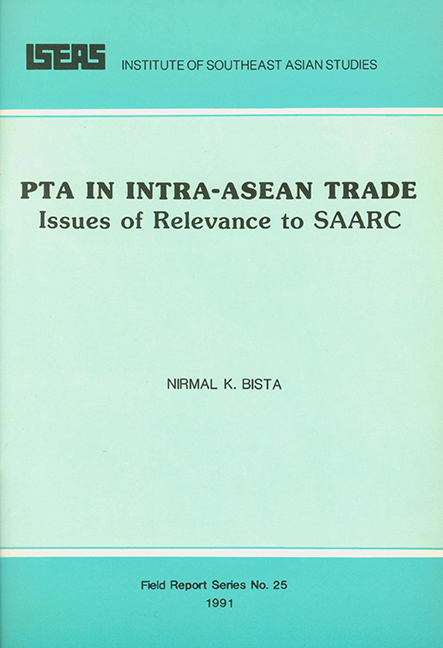II - Structure of ASEAN and SAARC Trade
Published online by Cambridge University Press: 21 October 2015
Summary
ASEAN'S Economic Features
The total population of ASEAN member states reached 314.9 million in 1988. Extreme di sparity exists in the level of income among these countries. The lowest per capita Gross National Product (GNP) was US$490 for Indonesia while Brunei was placed at the top with US$17,000 mainly due to its abundant oil resources. Singapore, recognized as a Newly Industrializing Economy (NIE), had the second highest per capita income with US$10,450 and has since attained developed country status (Table 2.1). Indonesia and Malaysia, both rich in natural resources, are fast expanding their manufacturing capabilities. Thailand is also rapidly developing as an exporter of manufactures with a solid agricultural base; it has registered the highest growth rate in the region. The situation is not similar for the Philippines which is constrained with a host of socio-economic and political problems.
The region as a whole was considered a high-growth area during 1971–80 and has carried the momentum into the nineties. GDP growth in Thailand in 1990 was the highest in ASEAN — at 10 per cent — and is expected to be maintained in 1991. The GDP growth rate of the Philippines on the other hand was 2.5 percent in 1990, the lowest in the region, together with highest inflation rate at about 15 per cent. However, the average growth rate in the region is well above that of many developing economies outside the region. Singapore has been maintaining the economic pace with its usual role as an “entrepôt” for trade and a centre of production and investment with increased emphasis on high-technology activities.
A look into the sectoral share of GDP shows an increasing role of the industrial and service sector implying a continuing transformation of the economy from a primarily agricultural base to an industrial and service sector base. In 1989 the agricultural sector in the Philippines contributed 26.9 per cent to its GDP with the domination of the service sector (40%) and industry (33.1%).
- Type
- Chapter
- Information
- PTA in Intra-ASEAN TradeIssues of Relevance to SAARC, pp. 3 - 12Publisher: ISEAS–Yusof Ishak InstitutePrint publication year: 1991

